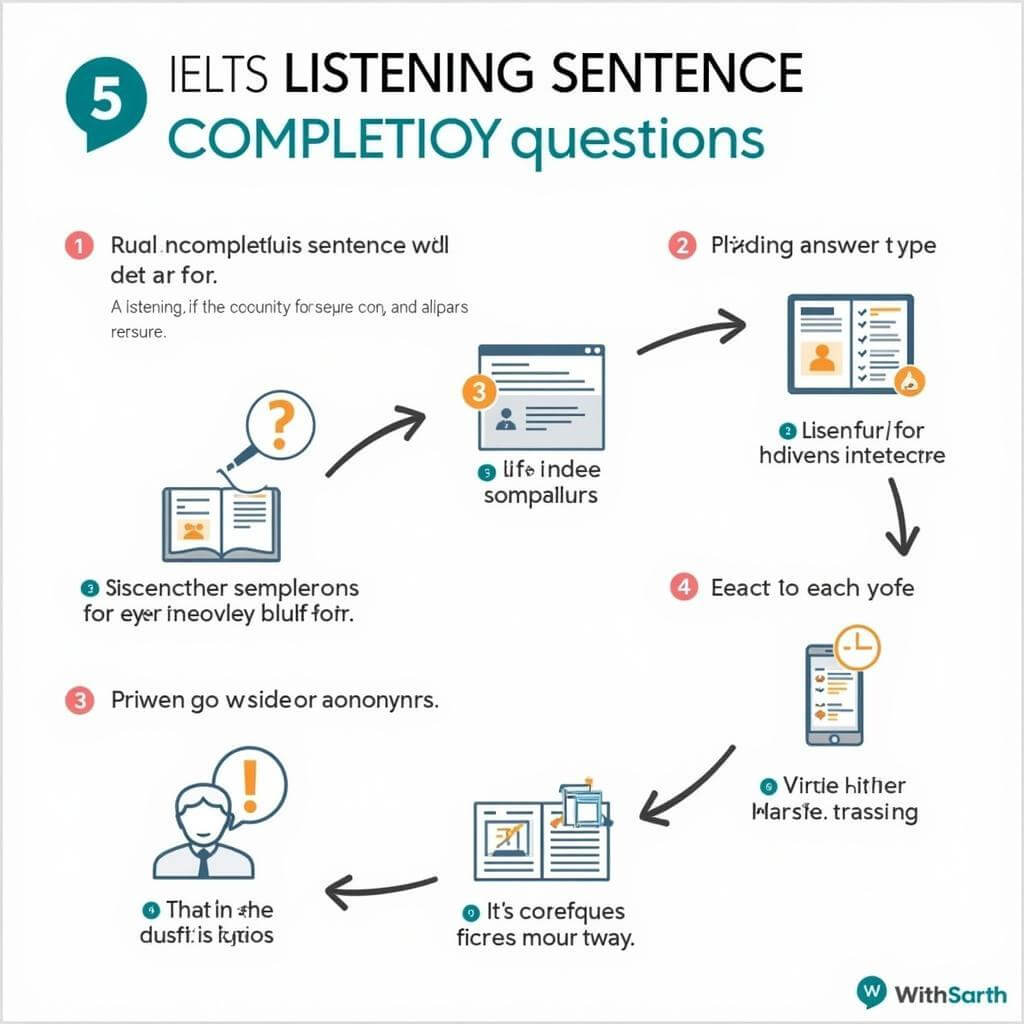IELTS Listening can be a challenging component of the test, particularly when faced with confusing question types. As an experienced IELTS instructor, I’ve helped countless students overcome these hurdles. In this comprehensive guide, we’ll explore effective strategies for handling confusing question types in IELTS Listening, ensuring you’re well-prepared for test day.
Understanding the IELTS Listening Test Structure
Before diving into specific strategies, it’s crucial to understand the overall structure of the IELTS Listening test. The test consists of four sections, each with increasing difficulty:
- Section 1: A conversation in a social context
- Section 2: A monologue in a social context
- Section 3: A conversation in an educational context
- Section 4: A monologue on an academic subject
Each section presents unique challenges, and how to handle IELTS listening with multiple speakers becomes particularly important in Sections 1 and 3.
Common Confusing Question Types and How to Handle Them
1. Multiple Choice Questions
Multiple choice questions can be tricky, especially when options are closely related. To tackle these:
- Read the question and options before the audio begins
- Listen for synonyms or paraphrases of the options
- Eliminate obviously incorrect answers
- Be cautious of distractors – information mentioned but not relevant to the answer
“Multiple choice questions often contain subtle differences. Train your ear to catch these nuances by practicing with various accents and speech patterns,” advises Dr. Emma Thompson, a renowned IELTS preparation expert.
2. Matching Information
Matching exercises can overwhelm test-takers with the amount of information presented. Here’s how to approach them:
- Quickly read through all options before the audio starts
- Focus on key words in both the questions and options
- Take notes as you listen, matching information as you go
- Double-check your answers if time permits
3. Sentence Completion
Sentence completion questions test your ability to identify specific information and write it accurately. To excel:
- Read the incomplete sentences carefully before listening
- Predict the type of word needed (noun, verb, number, etc.)
- Listen for synonyms or paraphrases of the information in the sentence
- Write exactly what you hear – don’t try to paraphrase
 IELTS Listening Sentence Completion Strategy
IELTS Listening Sentence Completion Strategy
4. Map/Plan/Diagram Labeling
These visual questions can be particularly confusing. Follow these tips:
- Study the image carefully before the audio begins
- Identify the starting point and likely order of information
- Listen for directional language and landmarks
- Write your answers as you listen – don’t wait until the end
5. Short Answer Questions
Short answer questions require precise understanding and accurate writing. To handle them effectively:
- Read the questions beforehand to know what information to listen for
- Pay attention to the word limit specified
- Listen for synonyms and paraphrases of the question wording
- Write down the exact words you hear that answer the question
Advanced Strategies for Handling Confusing Questions
-
Develop active listening skills: Train yourself to focus intensely on the audio, even when faced with challenging questions.
-
Practice note-taking: Develop a personal shorthand system to quickly jot down key information.
-
Improve your prediction skills: Before each section, try to predict the type of information you might hear based on the questions.
-
Enhance your vocabulary: Expand your knowledge of synonyms and paraphrases commonly used in IELTS Listening.
-
Familiarize yourself with various accents: IELTS uses speakers with different English accents. Regular exposure to these will improve your comprehension.
Dr. James Chen, an IELTS examiner with over 15 years of experience, emphasizes, “The key to mastering confusing question types is consistent, focused practice. Analyze your mistakes after each practice test to identify patterns and areas for improvement.”
Common Pitfalls to Avoid
-
Overthinking: Don’t spend too much time on one question. If you’re unsure, make an educated guess and move on.
-
Losing focus: Stay engaged throughout the entire recording, even if you miss an answer.
-
Spelling errors: Remember, incorrect spelling results in a wrong answer, even if you understood the audio correctly.
-
Misreading instructions: Always read the instructions carefully, especially regarding word limits.
-
Panicking when faced with unfamiliar topics: Trust in your listening skills, even if the subject matter is new to you.
Targeted Practice Techniques
To improve your ability to handle confusing question types:
-
Timed practice: Simulate test conditions to improve your time management skills.
-
Section-specific drills: Focus on the question types you find most challenging.
-
Transcription exercises: Practice transcribing short audio clips to improve your listening accuracy.
-
Accent variety training: Listen to podcasts and news broadcasts from different English-speaking countries.
-
Peer review: Practice with a study partner and discuss your approaches to difficult questions.
Conclusion
Mastering the art of handling confusing question types in IELTS Listening requires dedication and strategic practice. By familiarizing yourself with common question formats, developing effective listening strategies, and consistently practicing under test-like conditions, you can significantly improve your performance. Remember, the key to success lies in your preparation and ability to stay calm under pressure.
Frequently Asked Questions
-
Q: How can I improve my concentration during the IELTS Listening test?
A: Practice active listening daily, minimize distractions during study sessions, and develop a pre-test routine to help you focus. -
Q: What should I do if I miss an answer during the test?
A: Don’t panic. Make an educated guess if possible, but focus on the next question to avoid missing more information. -
Q: Are some accents more difficult than others in IELTS Listening?
A: IELTS uses a variety of accents, but all speakers are clear. Regular exposure to different accents will help you adapt. -
Q: How important is vocabulary for the IELTS Listening test?
A: Very important. A broad vocabulary helps you understand synonyms and paraphrases used in the audio and questions. -
Q: Can I write in all capital letters on the answer sheet?
A: Yes, you can use all capital letters. The important thing is that your answers are clear and legible. -
Q: How can I improve my spelling for the IELTS Listening test?
A: Practice writing down words you hear in podcasts or news broadcasts, and review commonly misspelled words in English. -
Q: Is it better to read ahead or focus on taking notes during the audio?
A: It’s best to balance both. Quickly read ahead during pauses, but prioritize listening and note-taking when the audio is playing.


